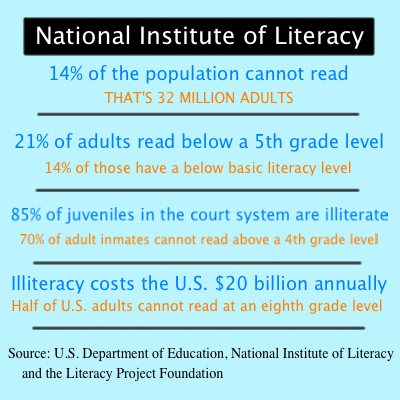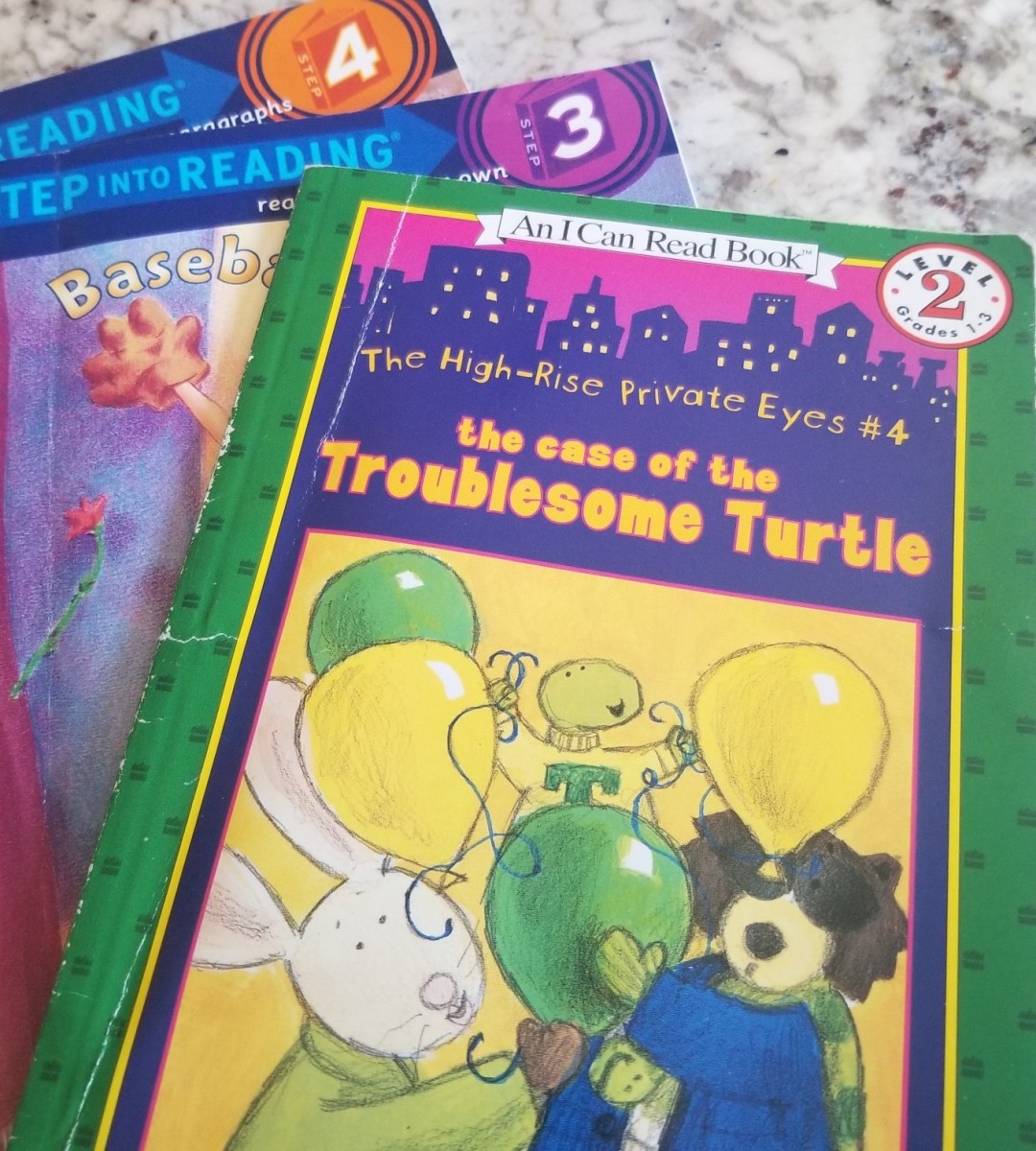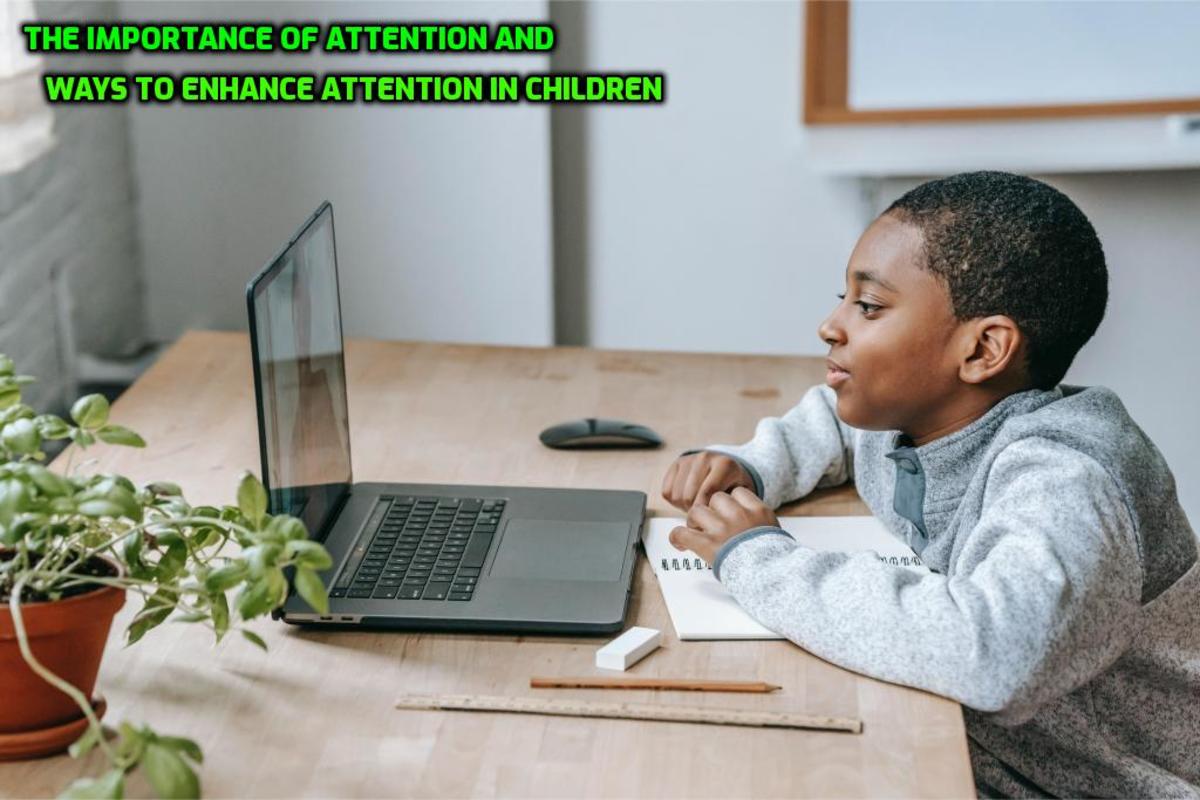The Importance of Literacy: Why We Must Encourage Our Children to Read

Reading in Teens
Read for Fun Daily
| 1984
| 2014
|
|---|---|---|
9 year-olds
| 53%
| 53%
|
13 year-olds
| 35%
| 27%
|
17 year-olds
| 31%
| 19%
|
Despite increased access to books through electronic devices and the Internet, adolescents are reading less than 30 years ago. [https://www.commonsensemedia.org/children-teens-an...]
Breaking the Cycle of Illiteracy
Childhood provides a vital opportunity to increase literacy rates among adolescents. Unfortunately, many children slip through the cracks and do not get the extra attention they need to develop a high reading level. Despite initiatives in schools across the country, over the past thirty years reading scores have remained relatively unchanged. In addition, research by Common Sense Media shows that children of all ages are reading less even though 75% of households have an electronic device for reading. We face a sad reality: our grasp on the importance of reading is slipping and our children will be the ones to pay the steep price.
Parents must begin the road to literacy by teaching at home. Through story telling, writing imitation, and alphabet recitation children are prepared for success in the classroom because parents have fostered an interest in reading and writing. With the help of educators and supportive parents, children have the ability to be successful academically and economically. The facts are less positive: our schools and teachers are stretched so thin that many children are not receiving the support they need to reach a successful level of literacy. On that same note, many parents faced the same problem in grade, middle, and high school so their ability to help those left behind by the education system is limited.
The cycle of raising illiterate children needs to break. The more importance society places on literacy in adolescents, the more likely our children will have a bright future. Literacy influences a person's life through social status, economic success, career choice, and educational goals. Every parent only wants the best for their child in each of the latter mentioned areas, but to change the path of our youth we must face and seek to change the statistics society loves to ignore.

Shocking Statistics
A quick look into literacy statistics provides a compelling argument for increasing literacy in the United States. According to the John Corcoran Foundation on ending illiteracy, there are 42 million adults in America with a 4th or 5th grade reading level or less, including those who cannot read. Of these adults, 43% live in poverty, and they account for 75% of food stamp recipients. The Foundation's statistics are just getting started:
- One in four children grow up without learning how to read.
- Children are five times more likely to drop out of high school if their parents did the same and are unemployed.
- High school students with below average literacy are six times more likely to have children out of wedlock who will also grow up illiterate.
- One million high school students drop out every year.
- Nine out of ten welfare recipients are high school dropouts.
- One-fifth of the students who do graduate cannot even read their high school diplomas.
- Half of the unemployed in the U.S. are aged 16-21 and are functionally illiterate.
One of the most important statistics is the most horrifying to think about:
"Two-thirds of students who cannot read proficiently by the end of the 4th grade will end up in jail or on welfare."
These same children grow up to be one of millions of adults who cannot read stories to their own children. Without a literate parent, they miss out on the early pre-school years of learning at home. If these children then do not get solid support in school, they will most likely grow up illiterate. Their children will likely do the same. The cycle continues. The problem grows. And our society continues to turn a blind eye.
Literate Nation
Reading Habits
What do you read most?
Pros and Cons of Technology in Literacy
It's a simple argument, yet completely inaccurate. Our adolescents surf the Internet. They text message. They read and post on Twitter and Facebook. So, really our kids and teens are reading, right? One glance shows that Twitter and text messaging are full of shorthand, acronyms, and slang that kids are learning on the fly instead of those that will increase their literacy.
Instead of reading an ebook on her iPhone, Molly's reading the latest status update from her friend Rick. Rick reads on a fifth grade level as a sophomore in high school. They share a distaste for reading because it's hard. It takes work. Because they were never helped to achieve a higher reading level. Molly once dreamed of college, but now she just hopes to finish high school. Her grade in English is dropping because she can't write a high school level paper. Rick barely achieved a passing grade on his latest history essay. Molly and Rick are examples of teens left behind by our education system. Such kids aren't reading and learning the sames skills they would from books because they're learning from fellow adolescents on the same or an even lower reading level.
In many ways, technology is hindering the ability of children to learn basic skills that will help them in the future. A quick Google search yields tons of information at their fingertips that they can skim and quickly insert into their latest essay. Tools such as Sparknotes almost eliminate the need to even read novels for class. Then, when they enter college and have to perform real research, their reading comprehension and critical thinking skills are not up to task. Based on ACT test results, only 25% of high school students are prepared for work at the college level. Instead of using technology to their advantage, adolescents are using the tools at their disposal to make their lives easier instead of prepare them for their future.
In contrast, technology opens up a wealth of information and opportunity for students. Almost every teenager has a smartphone and therefore has the ability to read eBooks at their fingertips. Thousands of free books are available through Project Gutenburg or Amazon. Teachers and parents can utilize reading comprehension software or games that teach vocabulary. Students have more access to technology through schools, so even those without computers at home have the opportunity, no matter how short lived, to learn with technology. If our school systems provide proper technological resources in the classroom and for teachers, students can use technology to enhance their literacy.
Despite the growing digital world, literacy rates have remained unchanged in the United States. When teachers and schools lack funding and support for new technologies, the children suffer. The United States is not using all available tools to enhance literacy in children and the problem is only growing. The U.S. is the only OECD country whose current generation is less educated than previous generations. American children are falling behind. Their futures appear less bright.
![By Tim Pierce (originally posted to Flickr as lost) [CC-BY-2.0 (http://creativecommons.org/licenses/by/2.0)], via Wikimedia Commons By Tim Pierce (originally posted to Flickr as lost) [CC-BY-2.0 (http://creativecommons.org/licenses/by/2.0)], via Wikimedia Commons](https://usercontent2.hubstatic.com/9116171_f520.jpg)
Encouraging Literacy Begins At Home
A supportive home environment provides the most important tool of all for encouraging literacy in children: the parent. Parents can create a fun learning environment at home to supplement learning in the classroom.
- Build a library of books. Create an area filled with materials for all interests, moods, and family members. Don't focus on just younger children; fill shelves to encourage teens, too.
- Set aside daily reading time for yourself and your children. While they are young, read together. As they age, set an example for them to follow by reading yourself and requiring reading time every day as a family.
- Encourage children to write. Letters, notes, journals. Have them use the vocabulary they are building.
- Be involved! As children age, many parents leave them to their own devices for homework and assigned reading. Keep track of their reading assignments. Perhaps even read novels together and open family discussions to continue encouragement through the teenage years.
- During summer months, set required reading in older children. Continue to push the importance of literacy. Too often we forget that teenagers are still learning, too.
Growing up among family that encouraged reading made a huge difference in my life. From a young age, my grandfather nurtured my love of reading. In high school, I always had a book in hand. I read between assignments and classes. I read late into the night and on the bus every morning. I witnessed the struggles of my fellow students, yet I was thankful that I did not face the same obstacles. Even when starting college I was shocked at the difference in literacy and writing levels in my classmates. School wasn't challenging and now I know why: I was being taught on the level of the average high school student. Students whose literacy levels were not where they should have been. It's not that I was that smart; I was just provided the tools and support to succeed.
I often edit and proofread college essays for freshmen and sophomore undergraduate students, and it still shocks me to see how many write on a low grade level and how many don't know the organization for a basic essay. I try to justify it. Of course their writing is not what I'm used to seeing; I just completed graduate school. However, I know better, and it saddens me.
Parents, teachers, and students see the problems in our school systems and classrooms. We have a responsibility to stop relying on failing schools and overworked teachers to reverse the tide of literacy. Americans must own the problem and work together to solve it or the promise of the American dream will continue to fade. It starts at home with parents and family. It starts with me. With you.







